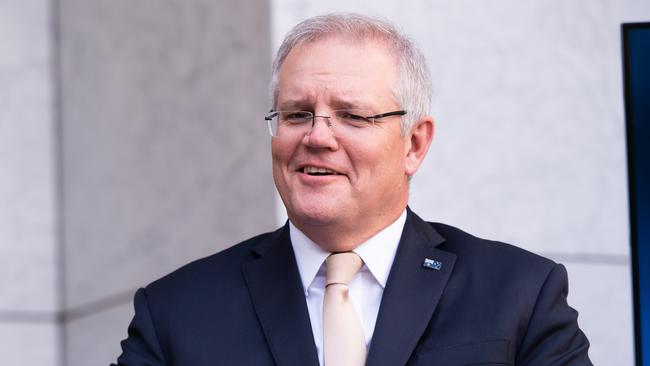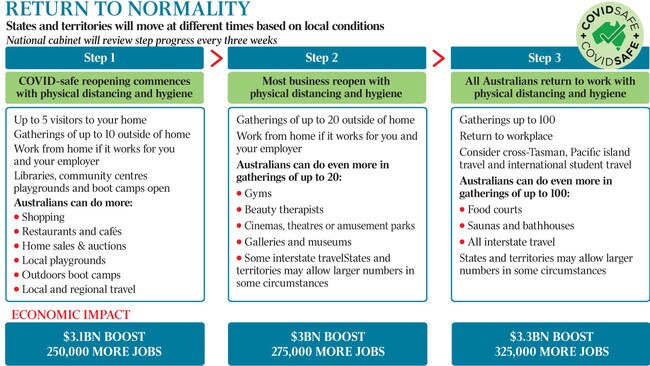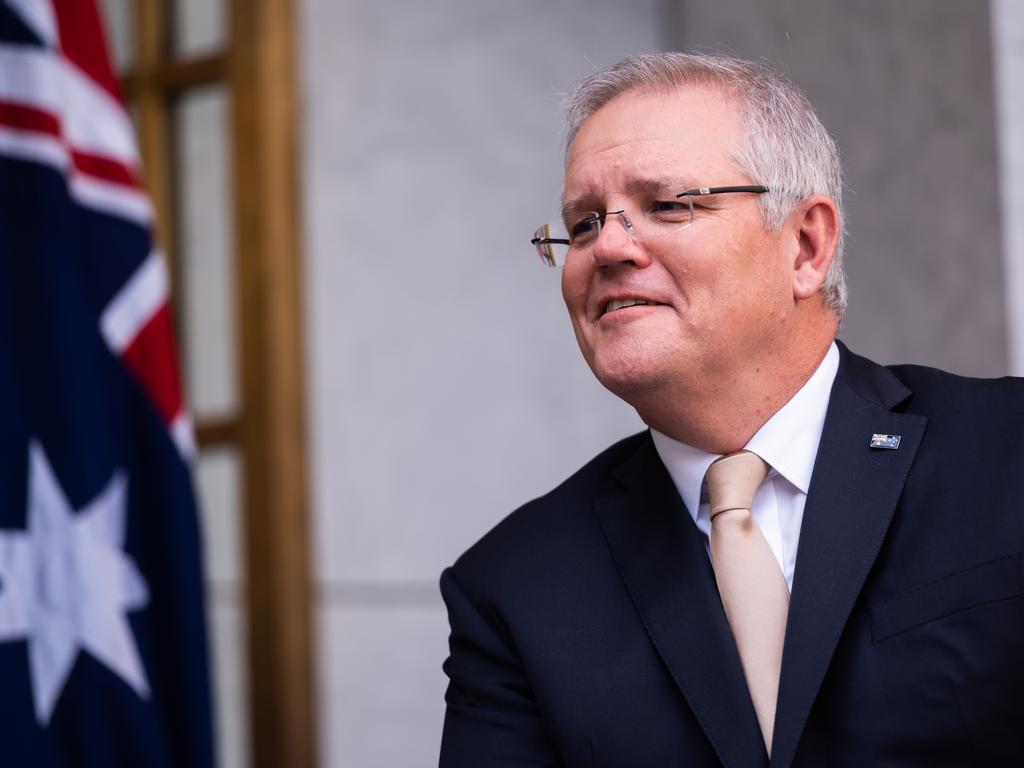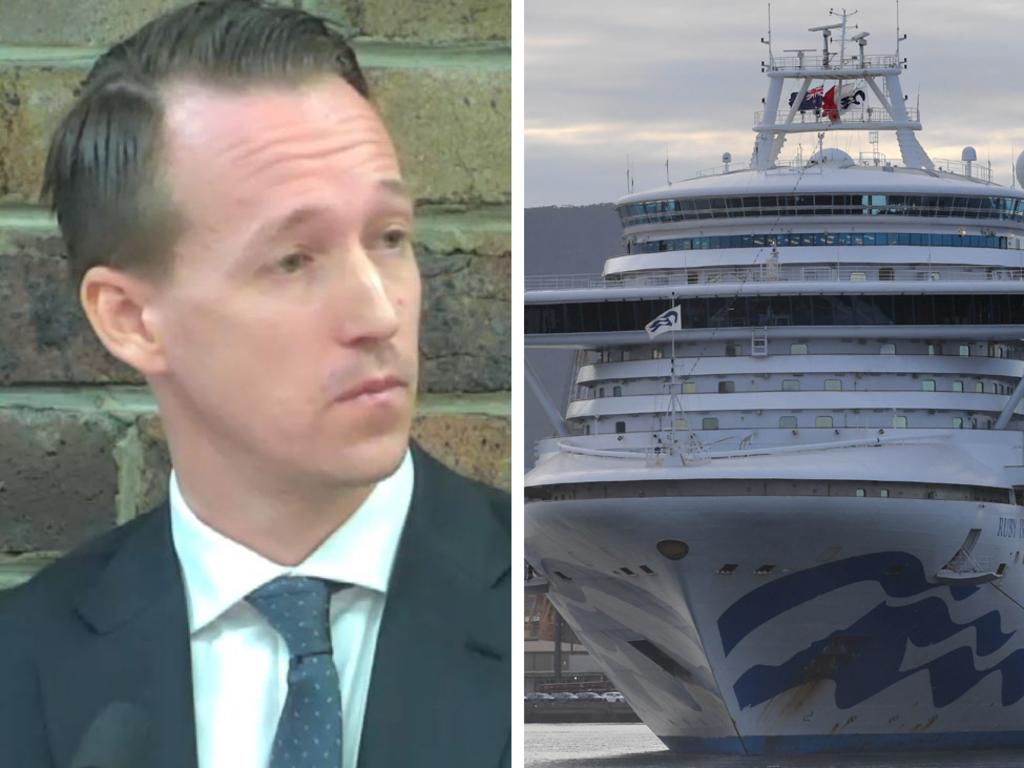Coronavirus: Scott Morrison says go on economy, but the big states say no
Businesses, workers and domestic travel will be back in operation by July under a three-step plan to revive the economy.

Businesses, workers and domestic travel will be back in operation by July under a three-step plan to revive 850,000 jobs and inject up to $9.4bn into the economy per month, with shops, pubs, playgrounds, pools and restaurants reopening as early as next week.
State and territory leaders will now decide how quickly to ease COVID-19 social restrictions and travel bans, after the national cabinet released a two-month framework on Friday to reboot the economy.
After more than six weeks of restrictions, Scott Morrison outlined the road to economic recovery and said it was time for the country to get out from “under the doona” and “put Australia in a position to go forward”.
“I think it is important that we all hold our nerve,” the Prime Minister said. “These are cautious first steps, but important first steps. You can stay under the doona forever and you’ll never face any danger. But we’ve got to get out from under the doona at some time. And if not now, then when?”

South Australia, Queensland, the ACT, Northern Territory and Tasmania moved immediately to begin easing restrictions; Western Australia, NSW and Victoria will finalise their strategies in coming days.
NSW Premier Gladys Berejiklian and her Victorian counterpart Daniel Andrews signalled they would not be rushed. Mr Andrews, criticised over his cautious approach to easing restrictions and resistance to allowing students to return to school, said he would announce his recovery plan on Monday.
Ms Berejiklian did not commit to an immediate lifting of baseline restrictions but said the national cabinet plan was a “clear pathway” to what people “can look forward to in coming months”.
While international borders were expected to remain closed for the foreseeable future, the national cabinet supported expanded travel within states and territories and a return to all interstate travel by July. They will consider cross-Tasman, Pacific Island and international student travel as part of step three.
The Prime Minister said step one of the COVIDSafe Australia roadmap was expected to support $3.1bn in economic activity per month and 250,000 jobs, an additional $3bn and 275,000 jobs under step two, and $3.3bn and 325,000 jobs under step three.
“National cabinet agreed on a three-step plan and a national framework to achieve a COVIDsafe economy and society and it is our goal to move through all of these steps to achieve that COVID-safe economy in July of this year,” he said.
“In this plan, we walk before we run. We know we need to be careful to preserve our gains, but we also know that if we wish to reclaim the ground we have lost, we cannot be too timid.”
The roadmap was unveiled after Josh Frydenberg used a mid-week address to warn of a $4bn hit to the economy for every week COVID-19 restrictions remained in place. The move ramped up pressure on state and territory leaders to take greater ownership of the economic recovery.
Under the new plan, Australians returning to work will be asked to avoid public transport in peak hour across all three steps, with steps one and two supporting working from home until workplaces develop COVID-safe plans.
The national cabinet will review the economic recovery plan every three weeks, with states and territories allowed to move at different times based on local conditions. As of Friday, there were 6914 confirmed COVID-19 cases in Australia, with only 738 active cases and 97 deaths.
States and territories will keep border control measures in place but Western Australia and South Australia are expected to ease restrictions earlier than the eastern states to get their economies moving faster.
The economic roadmap focuses on maintaining social distancing and hygiene measures and incremental increases in social gatherings and reopening businesses, recreational activity and travel. Under the three-step plan, some hospitality operators will be allowed to reopen, with restrictions placed on patron numbers.
Step one allows up to five visitors to homes, outside gatherings of up to 10, the reopening of libraries, community centres, playgrounds and boot camps, and increasing shopping, business and retail activity, including restaurants and cafes. Auctions and open homes can be held, with a 10-person restriction. Cafes and restaurants can open with 10 patrons at one time, maintaining 4sq m spacing per person. Step two would increase capacity to 20 patrons, and 100 by step three.
Up to 20 mourners indoors and 30 outdoors will be able to attend funerals under phase one of the road map, increasing to 50 and 100 under steps two and three.
The majority of businesses are expected to be operating under phase two, allowing gatherings of up to 20 outside home, as well as the reopening of gyms, beauty therapists, cinemas, caravan parks, camping grounds, amusement parks, galleries, museums and some interstate travel. Food courts, saunas, bathhouses and all interstate travel are expected to be back in operation by step three. Strip clubs and brothels will remain closed across all three steps.
Universities and technical colleges are being urged to increase face-to-face learning, with step three allowing for the consideration of the reopening of residential colleges and international student travel.
Mr Andrews, who flagged a move next week to support students coming back to the classroom before the end of term two, said there would not be a uniform approach to easing restrictions.
From next Saturday, Queenslanders will be able to head back to the pub and take day trips up to 150km from their homes, with Premier Annastacia Palaszczuk also easing restrictions on restaurants, clubs and RSLs. West Australian Premier Mark McGowan, who will announce his intentions on Sunday, said border bans would be the last COVID-19 restriction to be lifted but flagged loosening restrictions to “a greater degree than the eastern states”.
South Australia will begin lifting restrictions on regional travel, caravan parks, public pools, outdoor dining at restaurants and cafes, and face-to-face teaching at universities and TAFEs from Monday. Tasmanian Premier Peter Gutwein said a slow, staged easing of COVID-19 restrictions would begin from Monday.







To join the conversation, please log in. Don't have an account? Register
Join the conversation, you are commenting as Logout